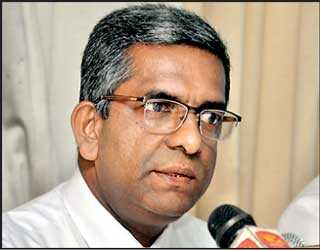Thursday Feb 19, 2026
Thursday Feb 19, 2026
Wednesday, 2 October 2019 00:22 - - {{hitsCtrl.values.hits}}
By Charumini de Silva
The Government yesterday assured tougher penalties to protect wild elephants whilst a final report on the investigations of the mysterious death of seven elephants will be ready by the end of this week.
Wildlife officials are also conducting further investigations to find out if the seven elephants were poisoned by unauthorised farmers in the village.
 |
Tourism and Wildlife Minister John Amaratunga |
 |
Tourism and Wildlife Ministry Secretary
|
 |
Wildlife Conservation Department Director General M.G.C. Sooriyabandara |
“While we condole, we are unable to come to a final conclusion on the cause of these seven elephant deaths. This has never happened in the history of our country, it is a great loss to the country, which considers elephants as a natural asset,” Tourism Development and Wildlife Minister John Amaratunga told the media. Department of Wildlife Conservation Director General Chandana Sooriyabandara said that following the preliminary investigations into the deaths of seven elephants in Habarana Forest Reserve, they have only found out had these jumbos have ingested toxic chemicals, but it was not yet clear if it was done deliberately.
“From the initial investigations and postmortem, we have found that there is a chemical poisoning. We still haven’t got any verification on the chemicals, and if this was a deliberate attempt to kill the elephants or an accident.
Therefore, we are now trying to verify that by sending the autopsies to three institutions: Government Analyst, Veterinary Research Institute and Faculty of Veterinary Science of University of Peradeniya,” he added.
Unclear on the profile of the toxic chemicals, Sooriyabandara said they suspect that it could be an agro chemical, industrial waste, or a bacteria or fungus.
“We are concerned and regret on what has taken place. I hope there’s no human-elephant conflict involved in this poisoning,” Amaratunga said.
Sooriyabandara also said that in his capacity as the Director General of the Wildlife Conservation Department, he has appointed a three-member committee to probe into the mysterious death of the seven elephants.
Noting that the Department has identified 16 elephant corridors in wildlife reserves where the majority of land has been invaded by unauthorised farmers, the Minister and the Director General admitted that due to development work, the human-elephant conflict has escalated significantly over the years.
Amaratunga said that development projects as well as unauthorised cultivations in the wildlife reserves have been a major cause for the increased number of human-elephant conflicts, adding that he has now called on the Government to create a proper plan and execute it in collaboration with all line Ministries and agencies.
“It is critical that we get our Ministries and institutions together in executing development projects,” he stressed.
The Minister also pointed out that all line ministries and departments have been requested to work together to ensure that elephant corridors remain fully accessible to the animals at all times.
Sooriyabandara said the Minneriya tank, which has been filled due to the rerouting of water to agriculture, has caused habitat loss for the elephants, which is a key reason why these animals disperse into villages in search of water.
According to official data, 293 elephants were killed in the first nine months of this year, while 93 people were killed by wild elephants straying into villages near wildlife sanctuaries. Last year, 319 elephants were murdered, while 96 people were killed by elephants.
“The numbers (of human-elephant conflicts) are escalating,” the Minister said.
According to data collected by the Department of Wildlife Conservation in 2011, Sri Lanka has a total wild elephant population around 5,000 to 6,000.
When animal activists who were also present at the media briefing pointed out that Sri Lanka has archaic laws which have very minor fines such as Rs. 100 for certain animal cruelty offenses, the Minister assured that the Government will expedite the implementation of tougher penalties on offenders.
Although for the offense of killing of an elephant is the death penalty, the Government has failed to implement it due to administrative delays for decades, therefore, currently the fine for killing a jumbo is as petty as Rs. 500,000, even in an protected wildlife reserve.
It was noted that to enact the death penalty for killing an elephant requires amendments to the existing Flora and Fauna Protection Ordinance.
The activists also claimed that the Government has turned deaf, blind and dumb, with no action taken on the owners of the so-called “tamed elephant” deaths reported during the weekend. Tikiri, who was to be paraded in the Kandy Esala Perahera, and the Tissamaharama Rajamaha Vihara elephant Tissa Saman, died in Pinnawala during the weekend.
Further, the animal activists highlighted that the Government has deliberately delayed passing the Animal Welfare Bill, which is stalled in Parliament for the past three years, noting that it is of great concern.
Pix by Lasantha Kumara
